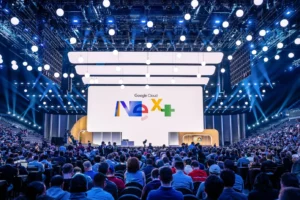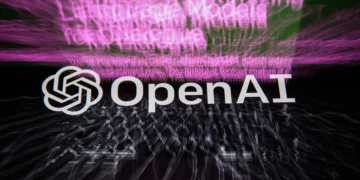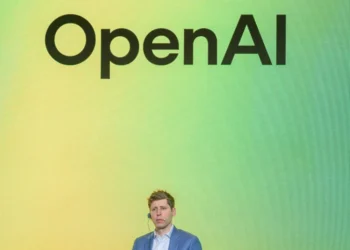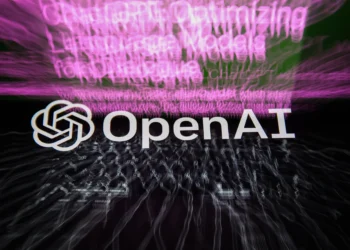
This week in Las Vegas, a crowd of 30,000 gathered to catch up on the latest developments from Google Cloud, which focused intensely on generative AI. Primarily known as a cloud infrastructure and platform provider, Google Cloud’s foundational aspects might have seemed overshadowed by the relentless AI headlines if you weren’t already aware.
While Google showcased significant advancements, it echoed Salesforce’s approach at its NYC event last year by largely sidelining its main business, only referencing it in relation to generative AI.
Google unveiled numerous AI improvements aimed at leveraging the Gemini large language model (LLM) to boost productivity on their platform. This objective was highlighted with multiple demonstrations during the main and Developer Keynotes on consecutive days, showing off the capabilities of these enhancements.
However, some demos appeared overly simplistic, constrained by the limited time of a keynote and primarily using examples from within Google’s own ecosystem, ignoring the common reality of companies storing data outside of Google.
In one instance during an e-commerce demonstration, the presenter had to call a vendor to finalize an online purchase, a step purportedly showcasing a sales bot’s communication skills, but which could have been straightforwardly handled on the website itself.
Nonetheless, generative AI presents several impactful applications, from code generation to querying extensive data sets or analyzing log data to diagnose website issues. Google also introduced specialized agents for different user groups such as developers and creatives, highlighting generative AI’s practical benefits in diverse areas.
While discussing the development of AI tools using Google’s models, rather than just using pre-built ones from Google or other vendors, it seems there’s an understatement of the potential hurdles for successful generative AI deployment. The presentations may have made it seem straightforward, but implementing advanced technology within large organizations is genuinely a formidable challenge.
Significant transformations are never simple. Similar to past technological advancements—like mobile, cloud computing, containerization, and marketing automation—each came with big promises but also added complexity, and large corporations often approach such changes with caution. Generative AI, in particular, appears to be a much more substantial challenge than what Google, or any major provider, might suggest.
Experience from previous tech transitions has shown that they often start with much enthusiasm but lead to significant disappointment. Even years later, many large firms, which arguably could benefit greatly from these technologies, are only tentatively exploring them or not engaging at all.
Various factors can hinder companies from embracing technological innovations, such as organizational inertia; outdated technology infrastructures that resist new solutions; or internal opposition from various departments like legal, HR, and IT, which often resist major changes due to internal politics or other reasons.
Vineet Jain, CEO of Egnyte, which specializes in storage, governance, and security, notes a division between companies. Those that have already transitioned significantly to the cloud find it easier to adopt generative AI, while those that have been slower to adapt face greater challenges.
He has spoken with numerous companies that still rely heavily on on-premises technology and are far from considering how AI might assist them. Jain mentioned to TechCrunch that he often encounters companies that are late adopters of cloud technology and are just beginning their digital transformation journey.
For these companies, AI might prompt a serious consideration of digital transformation, but starting from a position so far behind could pose challenges. Jain explained that these companies must first address their existing issues and then incorporate AI once they establish a robust data security and governance framework.
The challenge with implementing sophisticated technology like AI is that while it may appear straightforward at the user interface, the complexity lies deep in the backend. This week, the phrase “garbage in, garbage out” was frequently mentioned, highlighting that the quality of data used to train models like Gemini is crucial, especially for generative AI.
It all begins with data management. If a company’s data is not well-organized, preparing it to train large language models can be extremely difficult. Kashif Rahamatullah, a principal at Deloitte who leads their Google Cloud practice, was impressed with Google’s announcements but noted that companies with unclean data face hurdles in deploying generative AI solutions. He emphasized that discussions about AI often shift quickly to the need for clean, consolidated data to fully benefit from generative AI technologies.
From Google’s standpoint, they have developed tools to aid data engineers in building and managing data pipelines that link to various data sources, both within and outside the Google ecosystem. According to Gerrit Kazmaier, vice president and general manager for database, data analytics, and Looker at Google, these tools are designed to alleviate the labor-intensive tasks of data movement and preparation for model training.
These advancements should help streamline data connection and cleaning, especially for companies that are more advanced in their digital transformation. However, for those companies like the ones Jain referred to—those lagging behind in digital transformation—these tools might still pose significant challenges.
Moreover, AI introduces additional complexities beyond implementation, such as governance, liability, security, privacy, ethical usage, and compliance. Andy Thurai, an analyst at Constellation Research, pointed out that whether companies are deploying off-the-shelf models or developing custom ones, these aspects cannot be overlooked.
Many attendees of this week’s Google Cloud Next may have been searching for the latest updates from Google Cloud. However, for those not specifically interested in AI or whose organizations are not prepared for it, the overwhelming focus on AI might have been startling. For organizations without digital prowess, it could take a considerable time to fully leverage these technologies, beyond the solutions that Google and other vendors currently offer.















































